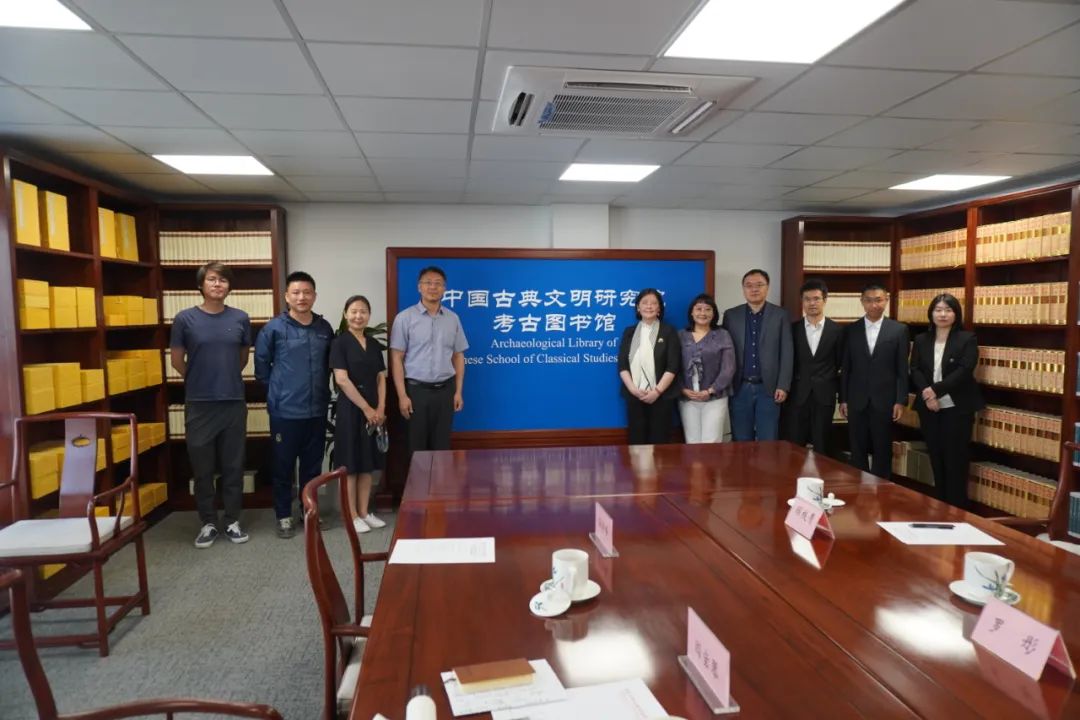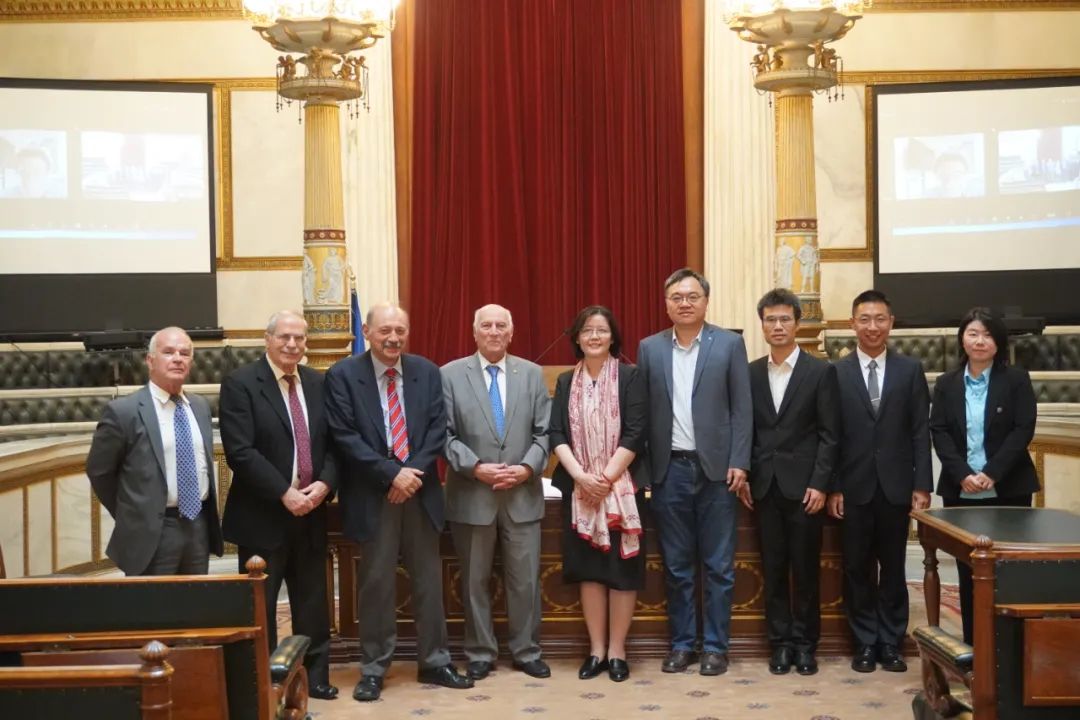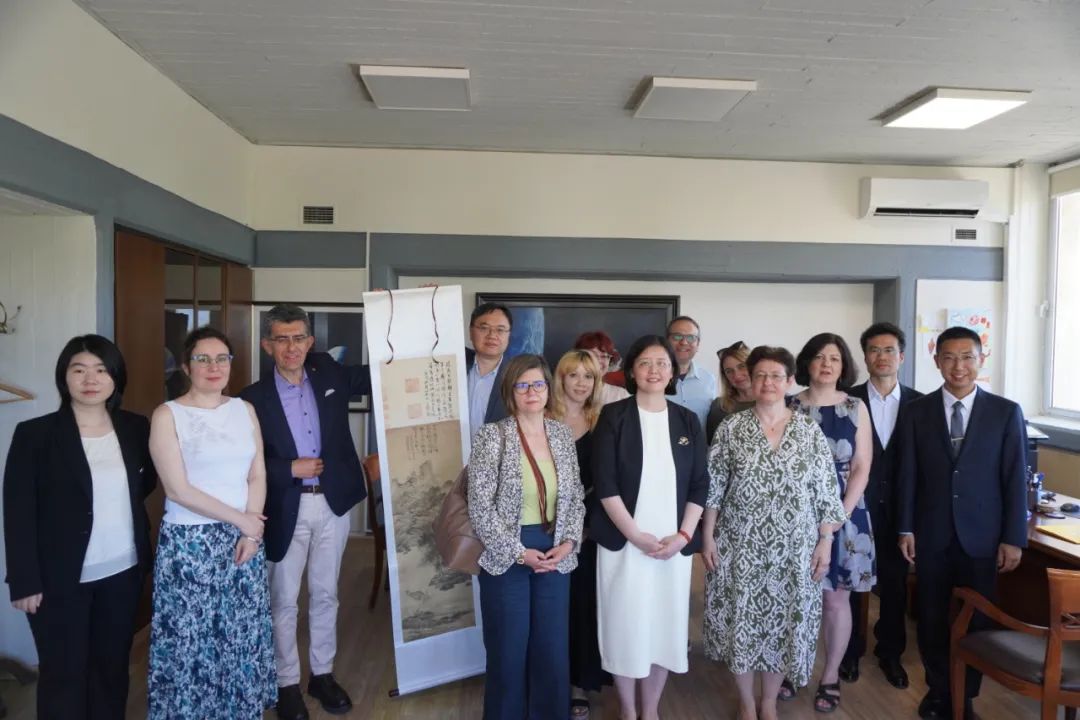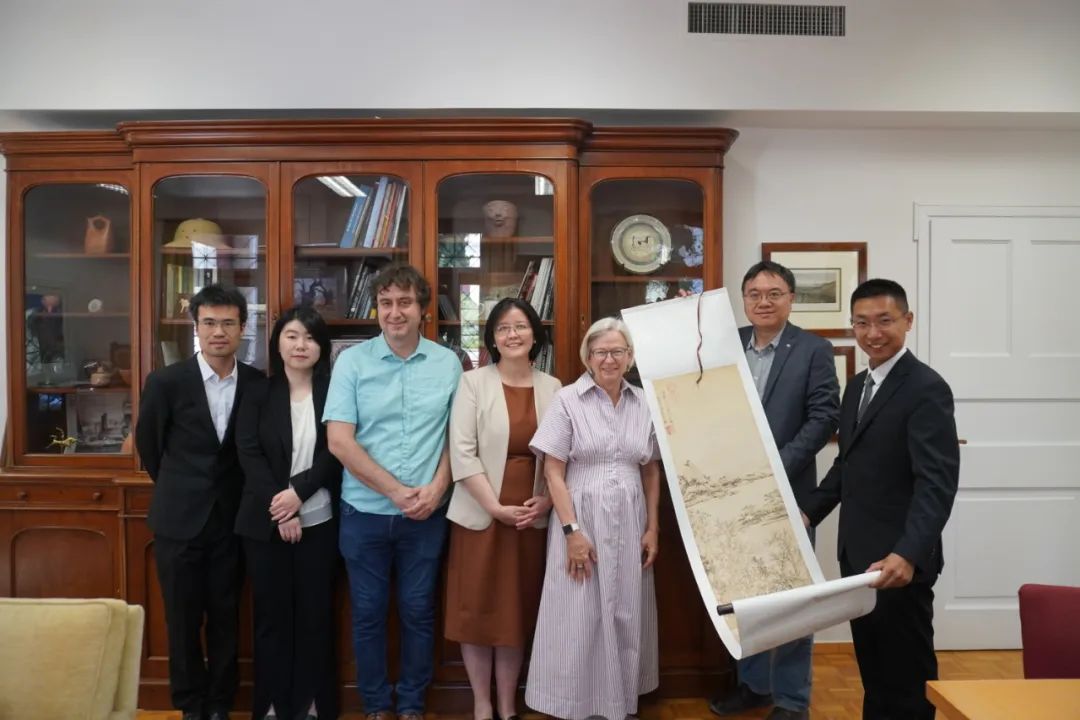

On 9 June 2025,a delegation of classical scholars from the Institute of Foreign Literature,Chinese Academy of Social Sciences (CASS),including researchers He Fangying and Chen Lei,and assistant researchers Zhang Peijun,Gu Zhiying, and Xie Qinglu,arrived in Athens,Greece,for a five-day academic visit.During their stay,the delegation visited the Chinese School of Classical Studies at Athens (CSCSA),the Academy of Athens,the School of Philosophy of the University of Athens,and the American School of Classical Studies at Athens (ASCSA),and held four academic discussions with local scholars.In addition,the delegation toured the archaeological library of the CSCSA,the main building and library of the Academy of Athens,the special collections of the library of the University of Athens, as well as the archives and archaeological laboratory of the ASCSA.

▲The delegation visits the archaeological library of the CSCSA
As the first research institution in Greece dedicated to Asian classical civilizations,the CSCSA was officially established on 7 November 2024.It is committed to building a leading academic platform for cross-civilizational dialogue.Through interdisciplinary research,it carries out in-depth studies of ancient Greek civilization,Chinese civilization,and other major classical civilizations of the world in a systematic way,serving as a concrete step in implementing the Global Civilization Initiative proposed by President Xi Jinping.
At 16:00 on 9 June local time,the delegation, having just arrived in Athens, paid their first visit to the CSCSA,which has been established for less than a year.They were warmly received by all members of the CSCSA.Colleagues from the CSCAS and the visiting delegation held a discussion in a bright and tidy conference room.Li Chuyu,the CPC Secretary of the CSCSA,said that as the world’s twentieth and Asia’s first permanent research institution on classical civilizations based in Greece,the CSCSA has attracted considerable attention since its inception.From the initial planning stage, we undertook a large amount of detailed and complex preparatory work.With the full support of the Party Leadership Group,what once seemed impossible was made possible,and the establishment of the CSCSA was successfully completed.Even during the Spring Festival,our team remained dedicated to their posts to ensure progress.The delegation was deeply moved by what they heard and expressed their sincere admiration for the colleagues of the CSCSA who have remained dedicated at the forefront of civilizational studies.They also shared their ideas and suggestions for the promising future of the CSCSA.

▲The delegation meets representatives of the Academy of Athens
Founded on 18 March 1926,the Academy of Athens is Greece’s highest scientific research institution,with its name tracing back to the historical Academy of Plato.The Academy conducts research across a wide range of disciplines,including natural sciences,philosophy and social sciences,and fine arts.It currently has 14 research centres,five offices, and one library.
At 11:00 on 10 June local time,the delegation visited the Academy of Athens,where the two sides held a meeting in the main building.Secretary-General Christos S.Zerefos delivered a welcome address in which he particularly highlighted the deep connections between Chinese and Greek classical civilizations.He concluded his remarks with a light-hearted anecdote.
“When Europeans come across something they cannot read, they often say,‘It’s all Greek to me!’So what do Greeks say in the same situation?‘It’s all Chinese to me!’So you see, we (Greeks and Chinese) are the same.”
Afterwards,the two sides held cordial and friendly discussions in the main conference hall of the main building.The delegation presented to the academicians of the Academy of Athens the progress made in the field of Western classical studies in China over the past three decades,along with related publications.The academicians expressed their admiration and amazement at China’s achievements in classical studies and extended their heartfelt congratulations and respect for the successful convening of the first World Conference of Classics in Beijing.Following the discussion, several elderly academicians warmly guided the delegation on a tour of the library and archives of the Academy of Athens.They moved up and down the staircases,introducing the facilities as they went.Their genuine warmth and kindness have left a deep impression on the visitors.

▲The delegation meets representatives of the School of Philosophy of the University of Athens
Founded in 1837,the University of Athens is the first University not only of Greece but both the Balkan peninsula and the Eastern Mediterranean region.The university has nine schools,with its faculty engaged in classical studies primarily based in the Faculty of Philology,under the School of Philosophy.In line with the continental European tradition,the Faculty of Philology is dedicated to the study of languages and literary works.It consists of four departments,including the Department of Classical Philology,the Department of Byzantine Philology and Folkloristics,the Department of Modern Greek Philology,and the Department of Linguistics.
At 9:00 on 11 June local time,Professor Dr Theodora Antonopoulou,Chair of the Faculty of Philology at the University of Athens,personally welcomed the visiting delegation at the entrance of the School of Philosophy.She enthusiastically introduced the epic mural of The Odyssey displayed along the Faculty’s colonnade.The delegation then held a meeting with faculty members in the conference room of the School of Philosophy to engage in discussions on academic topics of mutual interest.Professor Dr Theodora Antonopoulou gave an overview of the history of the Faculty of Philology and its institutions dedicated to classical studies,with a particular emphasis on its international student programme.This four-year undergraduate programme is designed for international students,with a curriculum centred on ancient Greek culture,covering a wide range of classical studies including archaeology,history,as well as ancient Greek and Latin literature.Professor Dr Theodora Antonopoulou expressed her warm welcome for Chinese students to actively apply for the programme.The two sides then discussed potential areas of future cooperation,laying out a blueprint for further academic exchanges and collaboration.Professor Dr Theodora Antonopoulou and her colleagues enthusiastically guided the delegation on a tour of the library of the School of Philosophy.In the special collections of the library,Professor Dr Theodora Antonopoulou showed the visitors several treasured manuscripts of ancient Greek classics.The delegation also focused on viewing the library’s extensive holdings of classical studies materials,a significant part of the entire collection,which include original texts (and translations) and scholarly works in multiple languages, such as English,French, German,Spanish,Italian, and Greek.

▲The delegation meets representatives of the ASCSA
Founded in 1881,the ASCSA has been rooted in Greece for 144 years.In addition,it serves as a base for scholars and students from around 200 universities in North America to conduct research and study in Greece.The faculty members of these institutions naturally form an important part of the academic resources of the ASCSA.The ASCSA is also the administrative base for all other archaeological research conducted in Greece by North American institutions.It has two libraries,the Blegen Library and the Gennadius Library,as well as an archaeological science research laboratory,the Malcolm H. Wiener Laboratory.
On the morning of 12 June,the delegation visited the ASCSA and held discussions with Professor Bonna Wescoat,Director of the ASCSA,and Professor Nikos Gkiokas,Deputy Director of the ASCSA.Professor Bonna Wescoat is a professor of Art History at Emory University.The silver-haired archaeologist is also the director of Excavations at Samothrace Island. She showed great interest in the successful convening of the first World Conference of Classics in Beijing and expressed her deep respect for the significant achievements made by Chinese scholars in the field of classical studies.After the meeting,Professor Nikos Gkiokas accompanied the delegation throughout their visit.Ms.Maria Georgopoulou of the Gennadius Library and Ms.Eleftheria Daleziou of the Archives had both made thorough and thoughtful preparations.They presented several rare books from the collections of the ASCSA and had even arranged in advance for the exhibition of archival materials and photographs related to Mr.Luo Niansheng of the Institute of Foreign Literature,CASS,during his study at the ASCSA.Afterwards,Mr.Dimitris Michailidis,Director of the Archaeological Laboratory,warmly guided the delegation through the lab.He gave an engaging and detailed introduction to a variety of carbon-based biological remains currently being cleaned,retrieved mineral specimens from storage for close examination, and patiently demonstrated the laboratory’s advanced 3D scanning and chemical analysis equipment.
Looking back on the five-day journey of China-Greek civilizational dialogue,the classical scholars from the Institute of Foreign Literature,CASS,forged valuable academic friendships through exchanges with their international counterparts,laying a solid foundation for deeper academic collaboration and future reciprocal visits.Moreover,through their on-site exploration of ancient Greek historical sites, the scholars transformed their knowledge from the page to the field,gaining a more profound awareness of the weighty responsibility that lies on the shoulders of China’s classical studies community.There remains a long way to go.Such topics as how to genuinely promote mutual learning among civilizations,how to awaken the vitality of classical wisdom in the modern world,how to build classical studies within the framework of world civilizational history,and how to contribute to the creation of new forms of human civilization within the historical context of civilizational integration will continue to be enduring goals for scholars in this field.




